- Home
- Nancy Pickard
The Blue Corn Murders Page 2
The Blue Corn Murders Read online
Page 2
She opened the brochure to peruse its generous listing of programs that were open to the public. Her glance landed on one that now seemed prophetically clear to her.
“Women’s Hike into History,” it advertised. “We invite you to join us at Medicine Wheel Archaeological Camp for an exciting program of exploration into the magnificent landscapes and the mysterious and fascinating cultures of the Ancient Peoples.”
Genia smiled to herself. Somehow, the first time she read that she had been able to resist “magnificent,” “mysterious,” and even “fascinating.”
She read on: “Join staff archaeologist Dr. Susan Van Sant and other members of our scientific community for five days of hiking into ancient ruins.” There, that was what she was looking for—the mention of a real archaeologist. In a program that long, she could surely ask a saddlebagful of questions, possibly learn a lot about the archaeological pedigree of her ranch. Besides, now that she had a reason for going, it sounded like a lot of fun.
But am I up to the physical demands? she asked herself.
Farther down in the brochure, she found the reassurance she sought: “Some of our hikes are in rugged country with no trails and at altitudes over 6,000 feet. A reasonable level of hiking skill and stamina is required, but our pace will be leisurely.”
That sounded all right to a sixty-four-year-old woman who spent at least part of every week on horseback and who regularly swam laps in her own pool. She peered closely at the smiling men and women shown in pictures that had been taken amid archaeological digs and ruins, and counted several who looked about her own age.
“While we take every precaution to assure the safety of our guests,” the brochure warned, “we assume no responsibility in the event of accident, illness, or injury. Visitors participate at their own risk.”
That’s all right, too, Genia decided. Life is risk.
“For fall hikes, we recommend you bring at least one pair of comfortable hiking boots, sweatshirt, down jacket, long underwear, warm sleepwear and robe, several layers of outerwear including jeans and T-shirts, hat, warm gloves, and rain gear. (Snow is not impossible at this time of year.) Bring also: flashlight, water bottle, backpack, travel alarm. Don’t forget camera and film. Bring sleeping bag and rubber mat for one night’s camp-out.”
Genia mentally reviewed her belongings, checking off the items. Yes, she could pull it all together, if they would accept her reservation into the program. According to the schedule, the next one started … she ran her finger across a calendar …
Sunday night.
Only two days from now. Could she do it? From her bookcase, she pulled out a road atlas and measured the distance from Tucson to Cortez. Almost five hundred miles, two thirds of it on the interstate. With stops along the way, she was looking at a ten- to twelve-hour drive.
Too much for one day, she decided regretfully.
But what if she started as soon as tomorrow, thereby slicing the drive in half?
It would still be a long haul by herself, and she’d be tired when she arrived, but she thought she could manage it and still enjoy the ride … up through the red rock country north of Phoenix, across the desert into Gallup, and then up through the Navajo Reservation, past famous Shiprock and on through Montezuma, into Cortez.
Years before she had gotten over most of her fears of traveling alone. Yes, there were stretches of busy or isolated roads that she’d just as soon avoid, but she’d learned that if she wanted to get from here to there, sometimes she had to grit her teeth and barrel through. Often no friend was available to go with her. But she didn’t let that stop her. She had decided, after Lew died, that she wasn’t going to become one of those widows who never left home without a man to do the driving or a woman friend to share it. (“Heavens,” she warned her own daughters, “you don’t want to get to the end of your life and still be waiting for somebody else to do the driving!”) Her courage and independence had grown, as a consequence of her daring, and she was glad of her choices. It didn’t mean she never worried about flat tires, it just meant she carried an automobile club card and, these days, a cell phone. God bless the twentieth century.
Still, she didn’t pick up the telephone receiver to make the call. She forced herself instead to lay down the brochure, sit back in her chair, swivel around to stare out at the mountains to the south, and then argue with herself.
“You’re being awfully impulsive,” she informed herself, speaking from the more conservative side of her nature. “Are you sure this is a good idea? Can you afford it?” Yes, a knowlegeable-sounding voice in her head assured her. “All right, but can you afford the time?” Uh-huh. The voice sounded amused, which only prompted her conservative side to speak more sternly. “But what do you really know about this Medicine Wheel place?” Well, dear, it says it’s a well-known, reputable, and respected center for southwestern archaeology and scholarship. “And you believe everything you read?” she demanded of the inner voice. “What do you think it’s going to say, that it’s a place of ill repute? And look here, my dear, according to that brochure, you’ll have to share living quarters with three other women, and there are no private baths, only communal showers! You’ll hate that!” I can stand it for a week. Less than a week. Sunday night till Saturday morning. The inner voice was patient, understanding, self-confident. “But why can’t you be satisfied with just contacting the archaeology department of a local university? Why do you have to go hiking for a week with a bunch of strangers to find out what you want to know?”
Because, because …
Genia let her glance fall once more on the provocative, persuasive brochure. And there it was, the clincher, the final argument against which no other logic could prevail:
“Our renowned chef,” it bragged, “prepares great meals.”
“Oh! Well!” said her conservative side, totally capitulating. “Why didn’t you say so in the first place?”
Now fully convinced of the intuitive wisdom of her original impulse, Genia picked up the phone to call the toll-free number. A young man on the other end of the line introduced himself as the assistant director and informed her there was still an opening in the program. “Would you please give me your full name?” he asked courteously. “And to guarantee your reservation, I’ll need your credit card number and your expiration date.”
“My expiration date?” she asked, amused. “Or my credit card’s?”
There was a surprised silence, then a burst of laughter. “Just the card’s,” the young man said, chuckling. “Unless you think you’ll be expiring on our tour?”
“I hope not.”
“We discourage that kind of thing.”
“I’m very glad to hear it.”
By the time she hung up, she already liked the Medicine Wheel Archaeological Camp. If the rest of the staff were anything like the fellow who took her reservation, they were a mischievous, good-humored lot. She suddenly felt very good about this decision to plunk herself down amid the ruins of a people who had managed to survive for hundreds of years without a single computer.
“There,” she said, pleased. “That’s done.”
* * *
The reasons for her extravagant gesture still lay on her desk. She felt, oddly, as if some long-buried fragments of her own psyche had somehow worked their way to the surface along with these artifacts, although she didn’t know what they represented. She suspected that in pursuing the provenance of the pottery, the shell, and the mysterious sunken circles in her pasture, she might also be following clues about herself. Strange how strongly she responded to them. Just looking at them now, she experienced again the thrill she’d felt in the pasture. Her heart felt moved by these mysterious connections to a distant past. Whose hands had formed this clay? Whose imagination had created the design upon the shell? It shamed her to realize she knew more about prehistoric Egyptians than about the prehistoric peoples who had lived in what was now her own state, her own county. On her own ranch, for heaven’s sake! Now, spurred on by
her modest discovery in the pasture, she intended to paint in the blank spaces on the canvas of her knowledge.
Scooping up the artifacts on the paper, she walked to her kitchen for a plastic bag to put them in. While she was there, she also grabbed three sweet dream cookies to take back to the bedroom with her for a packing snack. They were addictive little molasses morsels, frosted to ensure their irresistibility, and named for their alleged magical ability to ensure a sweet night’s sleep, if downed by a fretful child just before bedtime with a small glass of milk. She made them as her mother had, with cinnamon, cloves, and ginger. Her grandmother on her father’s side had made them first—with lard, of course. Grandma left out the spices, too, and added more molasses, claiming it “ripened” after a few days. Genia didn’t imagine she would ever be able to prove that, as they tended to disappear within hours. On second thought, she took a fourth—just a little one—and nibbled her way back down the corridor, thinking.
For her, this particular decade seemed to be turning sweeter by the month. She had finally taken firm hold of the reins of the ranch, living on it for months at a time instead of dropping in for long visits and allowing it to be managed by other people. It was hard work, often difficult and exhausting, but she was also discovering that she loved it and that the days she spent outdoors, on foot, on horseback, or in trucks across rough country, were strengthening her. At a time when many of her friends felt as if they were running down like clocks, guttering out like spent candles, Genia was coming to the astonishing realization that she felt, acted, and even looked younger than she had in years. More and more lately, she was hearing the slightly envious-sounding question, “Genia, what’s your secret?”
“Hard work and sunshine,” she replied, to which many people seemed to automatically respond by muttering darkly about “retirement” and “cancer.”
Retirement? Ranchers like her didn’t know the meaning of the word. Cancer? She wasn’t a fool—she wore sunblock and big hats and long sleeves and long pants to block out the ultraviolet rays. But beyond taking the ordinary precautions, life was mostly risk anyway, it seemed to Genia Potter. You might as well step out boldly and meet it face-on, instead of allowing it to sneak up behind you and whack you over the head. That, at least, was her modest philosophy.
It had come as a welcome surprise to her to discover that one’s life could grow larger and richer and more delicious the farther one moved down its road, instead of narrowing and contracting and growing regretful. She was often simply astonished—and a bit superstitious—about how good it felt to be a woman sixty-four years old in America of the late twentieth century. Because she wasn’t callous, she knew perfectly well that her good fortune had a great deal to do with money and health. If she could have bottled them, she would have given those same ingredients in great doses to everyone.
If she felt a shadow, it was only a little anxiousness—usually experienced at about three o’clock in the morning—that all of the new sweetness and glow of her life might vanish, that something might happen to a grandchild, or her children might suffer, or bad health or financial loss might assail her, and that it could all end as quickly and traumatically as the awful day that Lew had been taken from her arms.
Later, when she packed the precious shards of pottery in her suitcase, she placed them inside a down vest, wrapped the vest in her long flannel bathrobe, and placed it in the center, in between all of her other clothes, to protect it on her long ride north.
Early the next morning, Saturday, while the desert was cool and dark and the white-winged doves slept in the mesquite, she placed the rest of the cookies beside her on the front seat. “I’d hate for them to overripen,” she said to herself as she pointed her headlights toward Colorado.
Three
As Genia traveled toward Tucson, the sun commenced its daily climb up the eastern slope of the Rocky Mountains. From there it rolled over the Continental Divide, then slid down the western slope to illuminate the top of Mesa Verde. Once upon a time prehistoric Indians had dammed streams there, farmed corn and squash, raised turkeys, hunted game. The sun plunged off the precipitous ledges into empty, spectacular ruins of cliff dwellings that those same enterprising human beings had designed and built in an astonishingly short period of time. They had lived in them and had abandoned them after only a century or so, rather as if all of the skyscrapers in Manhattan had emptied a hundred years after first shooting toward the sky. Today the sun, which once had ruled a prehistoric universe, awakened Ute Indians on their reservation exactly as it had once nudged open the eyes of their ancestors. In the humble egalitarian fashion of a former god, it glided on down the valley, through the streets of Cortez, among people who didn’t even remember having once worshiped it, and then gently (as yet concealing its full strength) lit the grounds of the Medicine Wheel Archaeological Camp.
Far from being the primitive tent-strewn outpost its name implied, the Wheel was a sophisticated campus, complete with a main lodge and outbuildings set on twenty-five pastoral acres. It encompassed siteworks—or digs—that were spread throughout the countryside and which were the reason for the camp’s existence. Visiting tourists stayed either in residential hogans, modeled on the traditional six-sided Navajo dwellings, or in dormers above the dining hall, the kitchen, and the staff offices in the main lodge. An old-fashioned veranda, lined with inviting wooden rocking chairs, ran the entire length of the front of the lodge. At this hour of the morning, only the breeze moved the chairs. They rocked in an irregular creaking line, as if the ghosts of the Anasazi had settled into them.
Below the veranda a young doe stepped out of the golden shade of a grove of aspen trees. The deer walked boldly down a path that wound down from the main lodge and looped around the ten residential hogans (all with their doors facing east, in keeping with ancient tradition). An observer might have thought the animal was headed for the showers at this convenient time on Saturday morning, before most of the tourists were up. But the doe stepped off the path just behind hogan six and trod slowly toward the darker privacy of the far pine trees.
A skunk nosed around the closed door of hogan two.
Several black-chinned hummingbirds hovered near a patch of cardinal flowers. They dived into the sweetness at the heart of the jewellike blossoms, calling, “Tchew.”
Out at some of the digs, some archaeologists were already up and working in blissful solitude down in the cool of an excavated kiva or inside ramshackle buildings where the detritus of centuries lay spread out on makeshift tables waiting to be catalogued. At other digs scientists would soon be juggling the physiologically improbable skill of keeping one eye on their own work and another on the well-meaning but frequently clumsy assistance of the tourists and students. The juggling routine would cause a few of the professionals to wonder why they had ever wanted to dig in the dirt in the first place, but most of them would think they were among the luckiest people on earth to be doing what they were doing, where they were doing it. There were no ruins anywhere in the world like the ones in the American Southwest; archaeologists and anthropologists from other countries salivated at the thought of participating in a dig here.
In the main lodge later that day, adult tourists would sit like well-behaved schoolchildren at tables, with pencils in their hands and printed grids and shards of ancient pottery in front of them.
“Oh, boy,” some of them would whisper, in eagerness and awe.
Out at the slickrock sites and far up in hidden canyons, other tourists would painstakingly apply trowel to dirt and whisk broom to crumbling brick, as they had been taught. In earthen chambers they would help archaeologists draw maps of the original placement of every uncovered item, every layer, every inch as it was revealed for the first time in centuries.
Around them Montezuma Valley would continue to busily grow its apple trees and other crops. But every now and then the tourists would get a funny feeling, as if they were being watched, and at that moment they would look up to see what had been there for
millions of years: the dark, flat-topped, mysterious-looking mesas that resembled low mountains with their peaks sliced off. At such moments the tourists would feel uncomfortably small and mortal. The huge scenery that was always there seemed to hide watchful eyes that looked down at the valley even as the people in the valley looked up.
Behind the mesas, to the east and north, mountains rose to snowy caps; to the south and west lay high flatlands, canyons, and desert. It was a dramatic landscape where human beings had appeared and then vanished over the millennia, leaving behind their pottery where snakes now slept, and hand-hewn caves where mountain lions raised their young, and mysterious pits that gradually filled with rocks and dirt, and strange empty towers where voracious eagles perched.
In the boys’ dormer on the second floor of the main lodge, a young teenager pulled back a curtain beside the bunk bed to which he’d been assigned and stared toward the east. He’d never been out of Texas before, never seen true mountains before this trip. They scared him. So big. So high and sharp. So easy to fall off of. There was a girl on their trip who called them “those ominous pointy things,” and everybody laughed at her, but he knew exactly what she meant. He and she, he figured they’d be quivering on the floor under the seats of the bus if they had to go over a mountain pass.
And what about avalanches?
After a moment he let the curtain fall back into place.
If Mom’s parents had never moved to the States, he thought bitterly, I wouldn’t have this problem; I’d be wearing a uniform and walking in a perfect line to class in Nagasaki. Although, if they hadn’t emigrated, he might never have been born. And even in Japan they had mountains; he had cousins who sent pictures of themselves grinning on skis, so even there they might make him go on field trips to Fujiyama or some other ominous pointy Japanese thing.

 The Scent of Rain and Lightning
The Scent of Rain and Lightning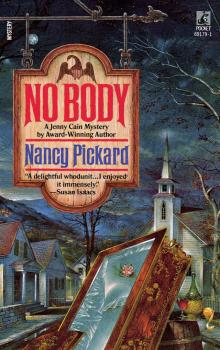 No Body
No Body The Secret Ingredient Murders: A Eugenia Potter Mystery
The Secret Ingredient Murders: A Eugenia Potter Mystery The 27-Ingredient Chili Con Carne Murders: A Eugenia Potter Mystery
The 27-Ingredient Chili Con Carne Murders: A Eugenia Potter Mystery Twilight
Twilight Marriage Is Murder
Marriage Is Murder I.O.U
I.O.U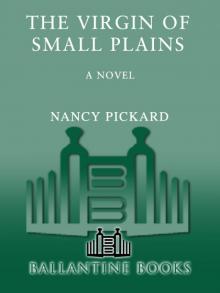 The Virgin of Small Plains
The Virgin of Small Plains Generous Death
Generous Death The Whole Truth
The Whole Truth The Blue Corn Murders
The Blue Corn Murders Say No to Murder
Say No to Murder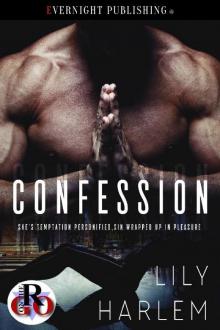 Confession
Confession Dead Crazy
Dead Crazy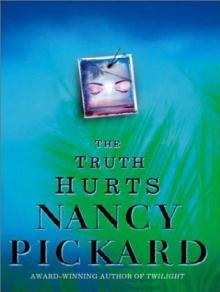 The Truth Hurts
The Truth Hurts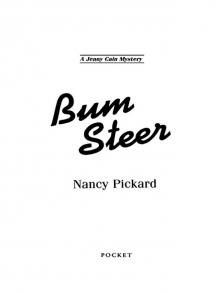 Bum Steer
Bum Steer